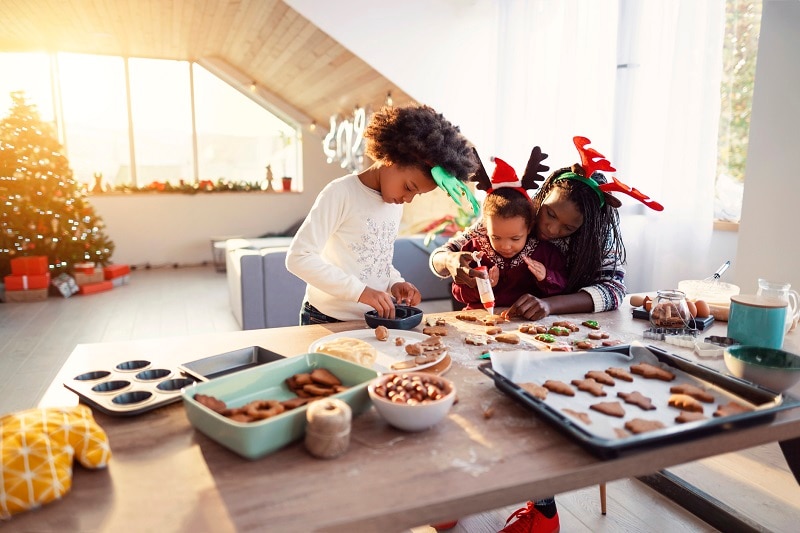‘Tis the season to be jolly, but the holidays can be a stressful time for individuals of all ages. In fact, according to a 2015 survey conducted by Healthline.com, 43.95% of respondents reported that the holidays were “somewhat stressful” and 18.42% reported that the holidays were “very stressful.” And this assessment was administered well before COVID-19—and all its related concerns—entered the scene!
Stress in Children: Identifying Signs and Symptoms
Do you suspect that your child may be battling holiday-related anxiety and stress? Following are some signs and symptoms to look for:*
- Complaints of body aches and/or headaches
- Confusion
- Emotional outbursts
- Fidgeting
- Loss of interest in usual activities
- Poor appetite or overeating
- Sluggishness
- Sleep disturbances
Helping Kids Manage Common Stressors
While every child and situation is unique, there are some common stressors that may impact kids during “the most wonderful time of the year.” Here are some tips for helping your child deal with these challenges.*
Final exams
Older children typically face final exams right around the holidays. Often, such tests count for a large percentage of their semester grade—a grade that will impact college admission for many. To help ease your child’s test-related pressure:
- Reinforce healthy dietary and sleep habits before and during test times
- Help them minimize distractions (e.g., TV, music) while studying
- Help them mentally rehearse taking an exam and having a successful outcome
- Help ensure they unwind with periodic study breaks (e.g., taking a short walk, shooting some hoops)
- Ask what else you can do to help ease their stress (e.g., quizzing them with flashcards)
Holiday travel
Kids of all ages may become stressed when traveling, especially during the holidays when the roads and airports can become extra crowded and not everyone is feeling especially merry. Kids may also feel anxious about spending the holidays with new people or in unfamiliar surroundings. To help your child overcome their worry:
- Outline what to expect. For older children, your description may be brief, while younger kids may require additional details. For instance, you may choose to describe what happens when you get to the airport, provide instructions for boarding the airplane, etc.
- Make them comfortable. Be sure to pack plenty of snacks and distractions (e.g., tablet loaded with never-before-seen movies, coloring books, etc.). Younger children may also be comforted by a sentimental object, such as a special blanket or stuffed animal.
- Adhere to a routine (as much as possible). Keeping bedtimes and mealtimes the same as usual can help ease seasonal stress, especially for younger children.
Celebrating in a new home
Children who recently moved may feel anxious about celebrating the holidays, especially if they are in a new city or state. Help your child cope with stress by:
- Adhering to familiar traditions. Try to keep some things the same—you may be in a new house, but you can still build a gingerbread house or binge watch your usual holiday movies!
- Creating some new traditions. Research upcoming holiday events near your new home and ask your child if there’s anything they have always wanted to do during the holidays. Now may be the perfect time to start!
- Helping them stay in touch. Help your child connect with friends and family via the telephone or videoconferencing. Catching up with loved ones can definitely help make their spirits bright!
A change in family dynamics
Kids may feel increased stress during the holidays if there has been a change in the family structure (e.g., birth or death in family, separation or divorce). You can help alleviate your child’s anxiety by:
- Encouraging them to discuss their feelings. Listen to their concerns and emphasize that their feelings are valid. Even if you don’t have all the answers, your attention and support can comfort your child.
- Honoring the deceased. If a parent or close relative has passed on, find a way to honor them during your holiday traditions (e.g., share stories about them, bake their favorite holiday cookie).
- Surrounding them with love. Invite extended family and friends to celebrate with you. Even though their presence can’t make up for a family member who is missing due to death or divorce, your child may feel less isolated.
- Involving your ex. If the separation/divorce was amicable, consider involving your ex in the holiday festivities, even if it’s only in a small way. If it was contentious, try to avoid casting your ex in a negative light.
- Creating some new traditions. Whether you lost or gained a family member (new siblings can cause stress, too!), enlist your child in creating some new holiday traditions. This can serve as a much-needed distraction, and they may even have some fun!
*If you are concerned about your child’s mental health, please consult a mental health professional.

